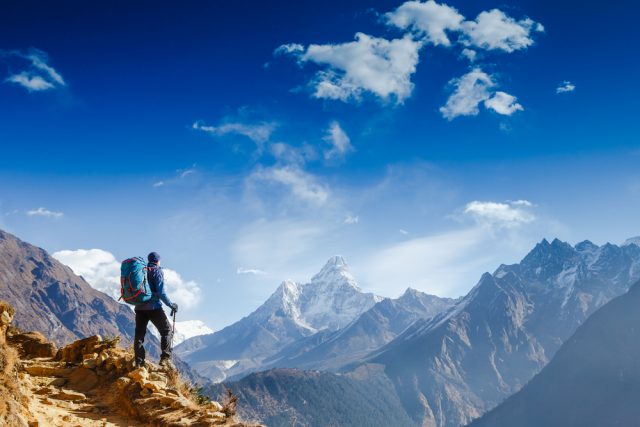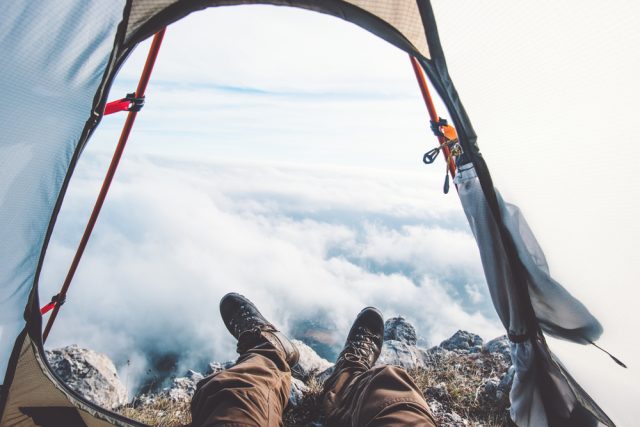 Olga Danylenko
Olga Danylenko
Obviously, packing for a city or even a beach holiday is quite different to putting together a bag for an eco or adventure outing, particularly one involving hiking/rambling/trekking and/or camping. It starts, of course, with the type of luggage. Instead of or in addition to your usual suitcase, you’ll want a sturdy, good-quality backpack with plenty of handy compartments and pockets. And as for what goes into it, I have a dozen solid suggestions, based on my own experience and those of others.
Electric Torch (Flashlight)
Whether you need to navigate a hostel room at night without disturbing your fellow guests, or around a tent in the great outdoors, a good torch – ideally with rechargeable batteries or even solar-powered – is a must.
Mobile With Extra Batteries
If you don’t want to totally unplug on holiday – or feel having your mobile handy is a prudent safety precaution – make sure your onboard battery is fully charged before arrival, and bring extra batteries and if possible a recharger. There are manual ones that require a bit of cranking to get a good charge, as well as solar-powered rechargers.
At Least One Change of Clothes
Even if it’s just for a day, it’s best to bring enough for two, especially if you don’t have a clear idea of the road ahead or you think that the weather could complicate things. The unforeseen does occasionally happen – from unexpected tumbles into streams to sudden soakings by rain. Socks are critical, as walking with damp socks is not only unpleasant but could cause dangerous chafing and end up really throwing a wrench into your plans.
Multiuse Knife
Useful for all manner of applications in the great outdoors, the famed Swiss Army Knife is of course the gold standard, but a number of less pricey but also high-quality similar models are widely available.
Drinking-Water Supply
Hydration when exerting yourself out of doors is absolutely critical – even when you’re not overtly thirsty – as dehydration can sneak up on you, especially in warmer climates. And carrying water bottles only goes so far, adding considerable weight and bulk, especially if you’re outside for long periods of time. So better to carry a reusable water bottle or two – of glass or hardened plastic – along with a portable water filter or water-purification tablets. Fill up at streams or lakes, apply your filter or pills, and take a hydrating swig!
Rain Gear
Compact, easily foldable rain gear is also a must, especially when hiking in tropical or other humid climates (and even ostensibly dry ones, where flash rains can come without warning). And a huge range is available, from cheap, flimsy plastic ponchos to (my preference) rubber garments especially treated to be water repellent – and these, too, can be surprisingly affordable. Not just a matter of comfort here, but also of health – steady rainfall can drop your skin temperature and leave you open to hypothermia.
 everst
everst
Sun Protection
Sun cream would seem to be a no-brainer in sunny conditions – sunburn can be not only uncomfortable but health-compromising. Just keep in mind, too, that even on cloudy days, plenty of UV rays are reaching your skin, and can result in burning as much as the scorching sun. Similarly, sunglasses, hats/caps, and long-sleeve shirts and trousers are highly recommended.
Heavy-Duty Trekking Trousers
Speaking of trousers, it’s not just sun you need to watch out for, but also the bruises, scratches, and insect bites likely whilst making your way through underbrush, forests, and the like. Available in a wide range for all budgets, trekking trousers don’t even have to be uncomfortably hot; many of the best models are made of lightweight nylon, offering both protection and breathability, and increasingly come with features like strategic pockets, zip-off legs, and articulated knees.
Insect Repellent
For those parts of your body which remain exposed – face, neck, hands, possibly arms – you’ll definitely want to keep bugs away, both for reasons of comfort and to avoid potential infections from the likes of Lyme-disease-bearing ticks. The chemical DEET has long been touted as the most effective, but there have been controversies surrounding its safety, and affordable, organic alternatives are also available.
Basic Meds
Along with whatever specific meds you need to take on a daily basis, a basic medicine chest should include pain reliever, Band-Aids, disinfectant, surgical tape, flexible wraparound bandages (for sprains and the like), an anti-diarrhoeal, blister cream, and saline solution.
And to all the above, I’d add, if you’re planning on overnight camping:
Lightweight Yet Sturdy Tent
If you’re planning to camp out on the trail, a good “roof” over your head is another must. As with the rain ponchos, a wide range of synthetic-material tents is available which deliver both a degree of insulation and impermeability to rain with breathability. Of course, if you’re going to be camping in an environment of particularly warm or cold conditions, you’ll want to search for particular models which stress one or the other of the above attributes.
Sleeping Gear
Obviously if you’re camping in a cool or cold climate, you’ll need a sleeping bag. But whether it’s hot, temperate, or cold outside overnight, I also heartily recommend a sleeping pad or mat. They come in a wide variety, some quite advanced both in their cushioning and insulation qualities; you can go even more deluxe with inflatable versions. And they roll up nicely to allow you to tuck them under your backpack.
Thus endeth the lesson. Happy rambling!

